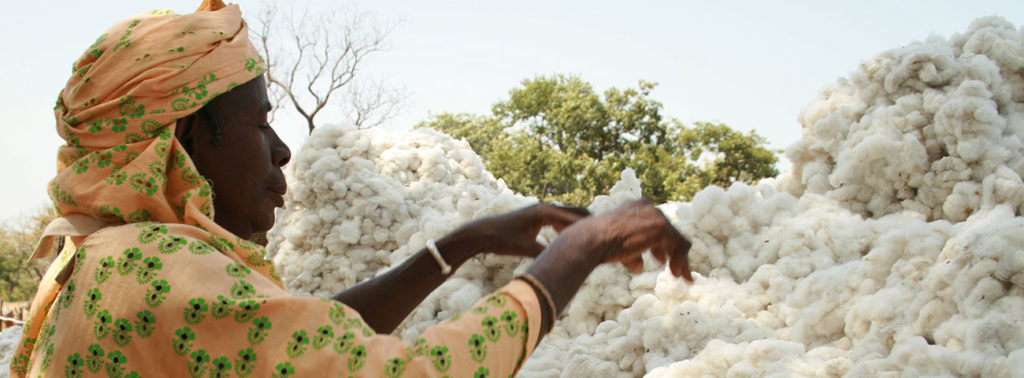Complex issues in the global cotton industry mean millions of small-scale farmers are struggling to make a decent living from growing cotton.
Why do cotton farmers live below the poverty line?
With high levels of illiteracy and limited land holdings, many cotton farmers live below the poverty line and are dependent on middle men or ginners who often buy their cotton at prices below the cost of production.
Rising costs of production, fluctuating market prices, decreasing yields and climate change are daily challenges, along with food price inflation and food insecurity. In West Africa, a cotton farmer’s typical smallholding of 2-5 hectares must provide the essential income to cover basic needs such as food, healthcare, school fees and seeds and tools. A small fall in cotton prices can have serious implications for a farmer’s ability to meet these needs. In India many farmers are seriously indebted because of the high-interest loans needed to purchase fertilisers and other farm inputs and have, in desperation, resorted to ending their lives. The notorious complexity of the cotton and textile supply chain means that farmers have little power to negotiate with others in the chain to secure better prices.
But in addition to these problems that plague most smallholder farmers, the situation in cotton is worse because the global cotton trade is heavily distorted by subsidies given to cotton farmers including in rich countries like the US and EU.
Government subsidies for domestic cotton production were up 33 percent in 2017/18 and totalled $5.9bn. 47 percent of world cotton production received direct government assistance in 2017/18. China led the way with $4.3bn paid. Government subsidies create a market with artificially low prices that farmers in lower-income countries are unable to compete in.
How does Fairtrade make things better?
Fairtrade works with the small-scale cotton farmers in Asia and Africa and helps build stronger farmer-owned organisations. This is important because farmers can achieve a lot more together as a group in negotiations with ginners and traders or in supporting the local community.
Fairtrade encourages sustainable cotton production and is the only standard to provide economic benefits, through a guaranteed Fairtrade Minimum Price and additional Fairtrade Premium for seed cotton farmers.
Watch this video about what Fairtrade means to cotton farmers in Senegal.
Through Fairtrade, thousands of cotton farmers have already improved their lives. Cotton co-operatives have become better organised, farmers are more productive and women farmers are receiving the same rewards as male farmers, from voting rights to equal pay. A study on the impact of Fairtrade cotton in four countries particularly noted the impact of Fairtrade Standards on gender equity. The study highlighted how a requirement in the Fairtrade Standards for seed cotton stipulating that women farmers should be paid directly (rather than through their husbands or other male family members) had encouraged more women in West and Central Africa to cultivate cotton. They considered that this had given them more influence over their household resources.
Read the latest cotton impact reports and research here
Boosting Fairtrade cotton sales for farmers
Fairtrade currently works with over 40,000 cotton farmers in regions with some of the lowest income in the world. They grow seed cotton on over 57,000 hectares and produce over 55,000 MT of Fairtrade-certified seed cotton. Global sales of over 10,900 MT of cotton lint in 2021 generated over £1.3million in Fairtrade Premium.
Meanwhile, globally, 90 million small-scale cotton farmers are all in need of a fairer deal for their cotton. There’s still a lot more that Fairtrade can do.
The Fairtrade Cotton Program therefore unlocks exciting new opportunities for businesses to buy more cotton on Fairtrade terms and expand market access under Fairtrade terms for more farmers. The new model recognises that businesses want to use more Fairtrade cotton in their manufacturing of clothing and textiles, rather than create a specific Fairtrade branded cotton range. Read more about the Fairtrade Cotton Program.
In the words of G S Rao, state coordinator of Fairtrade certified Chetna Organic in India, ‘Buying a fairly traded garment is not giving to charity, but is much more a positive statement of fulfilling ones commitment towards all the people who are ultimately responsible for the garment. Fairtrade has helped Chetna to lay additional focus on setting up farmers’ institutions and building their capacities on leadership and self-sustainability. Other certifications do not focus on building producers’ institutions and yet, this is the key to long-term sustainability. With setting up of farmers’ institutions, involvement of women has also slowly started to increase, though there is still a long way to go.’
More on Fairtrade cotton
More in-depth information on the cotton industry and Fairtrade cotton can be found in our Cotton Commodity briefing (pdf) .
